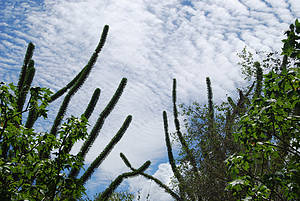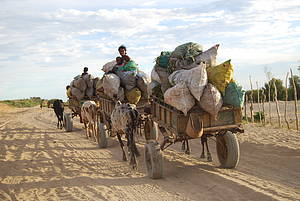Drought forces farmers into charcoal devastation
Two years of drought and late arrival of the rainy season in south western Madagascar have forced hundreds of farmers into charcoal producing which is devastating forests, according to WWF field staff at Tollara.
 |
|
Spiny forest, Mangily, Southwest Madagascar |
“Charcoal production in the South of Madagascar is particularly unsustainable as people cut the natural spiny forest, a unique ecosystem which exists nowhere else” says Bernardin Rasolonandrasana, Spiny Forest Eco-regional Leader for WWF in Toliara. “We are horrified to see the amount of charcoal currently coming out of those forests.”
Farmers were driven from their fields after rain did not arrive in quantity or the usual December to March periods over the last two years. Ironically the cyclone of the beginning of June, which brought rain in abundance and has now turned the area uncharacteristically green, was no help to farmers whose crops had already withered away.
The lack of regulations and control makes the charcoal business an obvious, if highly destructive alternative. Now threatened is an area of threatened natural spiny forest which received temporary protection status only in December 2008. PK-32 Ranobe, an hour north of regional capital Toliara is co-managed by WWF and an inter-communal association.
Number of "charbonniers" tripled
WWF agents have investigated the amount of charcoal coming south down the road to Tollara and assessing the number of villagers trying to make a living by producing charcoal. Proportions look similar in most villages.
 |
|
Charcoal traffic on the road to Tollara has increased 22-fold since the rains failed to arrive on time |
The number of so called “charbonniers” almost tripled over the duration of the normal rainy season.
A year ago, four trucks, each carrying a maximum of 250 bags, were doing the journey twice a week on this road. Today WWF agents count every day eight trucks carrying 400 bags each time.
“Whole charcoal villages just seem to spring up like mushrooms out of nothing,” says Rasolonandrasana “and other rural communities start a charcoal business although they have never been active in it. Some people even start cutting fruit trees because the forest was already losing ground.”
“Every village has a Tamarind tree in the middle of the village. In its shade village elders gather to discuss and perform rituals. Those trees are well respected. I have seen some of those old trees being cut down for charcoal, mainly by immigrants. It’s heart-breaking. ”
“A flourishing charcoal export is the last thing this country needs,"
While a heavy drought forces people to look for alternative livelihoods, commercial interests in charcoal increases. Companies started to show interest in exporting charcoal to the French islands of La Réunion, Comoros and Mayotte.
“Madagascar already struggles to meet its growing population’s energy needs," said Nanie Ratsifandrihamana, Conservation Director for the WWF Madagascar and Western Indian Ocean Programme Office. ,
"The export of large quantity of charcoal could lead to shortages on the local market and therefore an increase in prices. A yes towards the export of charcoal would definitely encourage even more people to cut forest and thus become charcoal producers.”
She added that a few years ago the control of the charcoal production through forest administration led to a rise in prices in Toliara and caused riots in the city. The forest administration had then decided to open charcoal production to everybody to calm the riots.
WWF’s Regional Representative in Madagascar, Niall O’Connor has initiated talks with the minister of environment in the capital of Antananarivo.
“A flourishing charcoal export is the last thing this country needs," O'Connor said. "Already, its unique fauna and flora are facing many threats. Another sale of natural resources would be devastating for the country”.
Madagascar is the world's fourth largest island and hosts countless endemic species such as lemurs, chameleons or the fossa, a mongoose-like nocturnal mammal which is the biggest predator in Madagascar. But much of the countries celebrated biodiversity is under threat as predatory commercial interests move in under the cover of nearly two years of political instability.
 0
0 






